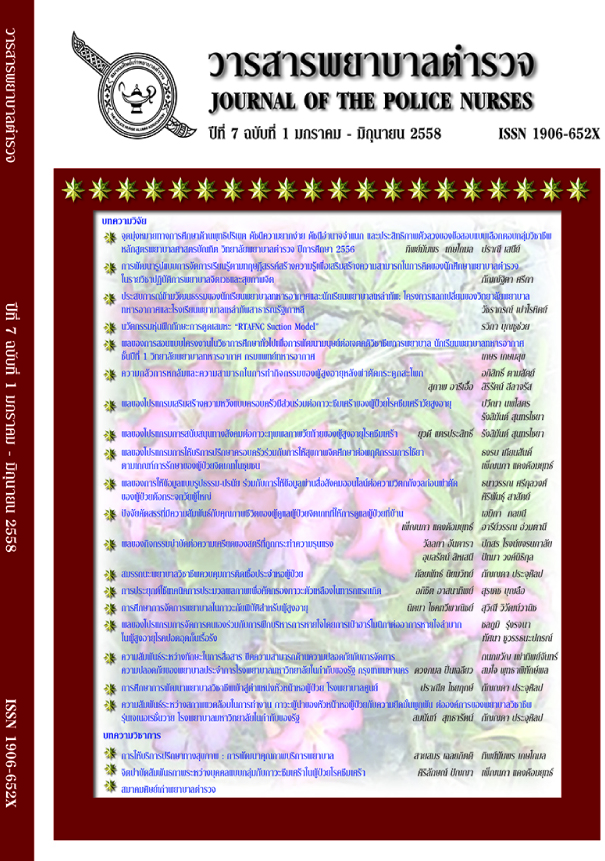ความกลัวการหกล้มและความสามารถในการทำกิจกรรมของผู้สูงอายุหลังผ่าตัดกระดูกสะโพก
Keywords:
ความกลัวการหกล้ม, ความสามารถในการทำกิจกรรม, การผ่าตัดกระดูกสะโพก, Fear of falling, Functional ability, Hip surgeryAbstract
กระดูกสะโพกหักจากการหกล้มเป็นสาเหตุหนึ่งที่พบได้บ่อยในผู้สูงอายุและผู้สูงอายุที่เคยหกล้มส่วนใหญ่จะกลัวการหกล้มซ้ำ ซึ่งส่งผลให้เกิดการหลีกหนีการทำกิจกรรมจนทำให้ความสามารถในการทำกิจกรรมลดลง การวิจัยนี้มีวัตถุประสงค์ เพื่อศึกษาความสัมพันธ์ระหว่างความกลัวการหกล้มและความสามารถในการทำกิจกรรมของผู้สูงอายุหลังผ่าตัดกระดูกสะโพก ตัวอย่างได้รับการคัดเลือกแบบเจาะจง โดยมีคุณสมบัติดังนี้ อายุมากกว่าหรือเท่ากับ 60 ปี ได้รับการวินิจฉัยกระดูกสะโพกหักและได้รับการผ่าตัดกระดูกสะโพก มีสมรรถภาพสมองปกติ ก่อนเข้าโรงพยาบาลสามารถทำกิจวัตรประจำวันได้ด้วยตนเอง เกณฑ์คัดออก ได้แก่ ผู้สูงอายุที่มีภาวะแทรกซ้อนหลังผ่าตัด เช่น ข้อสะโพกหลุด หรือ ผู้สูงอายุที่ไม่สามารถจำหน่ายกลับบ้านภายใน 4 สัปดาห์หลังผ่าตัด เก็บรวบรวมข้อมูลโดยการสัมภาษณ์ตามแบบสอบถามข้อมูลส่วนบุคคลและข้อมูลสุขภาพ แบบสอบถามความกลัวการหกล้ม และแบบสอบถามความสามารถในการทำกิจกรรม วิเคราะห์ข้อมูลโดยใช้สถิติบรรยาย สถิติ Wilcoxon Signed Ranks Test และสถิติ Spearman rank correlation coefficient
ผลการวิจัยพบว่า ผู้เข้าร่วมวิจัย 33 คน มีคะแนนความกลัวการหกล้มก่อนเริ่มฝึกเดินสูงกว่าคะแนนความกลัวการหกล้มหลังผ่าตัด 6 สัปดาห์ (39.59±27.14 คะแนน, 16.12±12.29 คะแนน ตามลำดับ) อย่างมีนัยสำคัญทางสถิติ (Z = -4.356, p < .01) คะแนนความสามารถในการทำกิจกรรมก่อนเข้ารับการรักษาในโรงพยาบาลสูงกว่าคะแนนความสามารถในการทำกิจกรรมหลังผ่าตัด 6 สัปดาห์ อย่างมีนัยสำคัญทางสถิติ (Z = -2.831, p < .01) ความกลัวการหกล้มก่อนเริ่มฝึกเดินมีความสัมพันธ์ทางบวกระดับต่ำกับความกลัวการหกล้มหลังผ่าตัด 6 สัปดาห์ (rs = .41; p < .05) และความกลัวการหกล้มก่อนเริ่มฝึกเดินและความกลัวการหกล้มหลังผ่าตัด 6 สัปดาห์ มีความสัมพันธ์ทางลบในระดับต่ำและระดับปานกลางกับความสามารถในการทำกิจกรรมหลังผ่าตัด 6 สัปดาห์ (rs = -.37; p < .05, rs = -.63; p < .01 ตามลำดับ)
ข้อเสนอแนะจากผลการวิจัยครั้งนี้คือ ควรส่งเสริมความมั่นใจในการเดิน และ/หรือ ลดความกลัวการหกล้ม จะช่วยให้ผู้สูงอายุหลังผ่าตัดสะโพกมีความสามารถในการทำกิจกรรมได้ดีขึ้นตามศักยภาพ
Fear of falling and functional ability in older adults undergoing hip surgery.
ABSTRACT
Hip fracture related to falls is one of the most common injuries among older adults. The majority of older adults who experienced falls will develop a fear of falling, which contributes to avoidance of activities resulting in functional ability declines. The main aim of this study was to examine the relationship between fear of falling (FOF) and functional ability (FA) among older adults undergoing hip surgery. Purposive sampling was employed. The prospective participants who met the inclusion criteria as following: being 60 years of age and over, being diagnosed with a hip fracture, being cognitively intact, and being able to perform daily life functions before admission, were recruited for this study. The participants who developed complications after surgery, such as hip prosthesis dislocations or not being able to be discharged to their homes within 4 weeks after surgery were excluded from this study. Data were collected
by the Demographic Data and Health Information Questionnaire; the Fall Efficacy Scale; and the Modified Barthel Activities of Daily Index. Data analysis was performed by using descriptive statistics, Wilcoxon signed ranks test, and Spearman rank correlation coefficient.
Results showed that 33 participants had a significance FOF scores before rehabilitation higher than that at 6-week follow-up (39.59 ± 27.14 scores, 16.12 ± 12.29 score, respectively; Z = -4.356, p < .01). FA scores before admission was significantly higher than at 6-week follow-up (Z= -2.831, p < .01). FOF before rehabilitation had a weak positive relationship with FOF at 6-week follow-up (rs = .41; p < .05). In addition, FOF before rehabilitation had a low negative relationship with FA at 6-week follow-up, and FOF at 6-week follow-up had a moderate negative
relationship with FA at 6-week follow-up (rs = -.37; p < .05, rs = -.63; p < .01, respectively).
Findings from this study lead to the suggestion that fear of falling before rehabilitation and at 6-week follow-up show a negative correlation with functional ability. To encourage fall self-efficacy and/or to reduce fear of falling may promote functional ability in older adults undergoing hip surgery.
Downloads
Downloads
Published
How to Cite
Issue
Section
License
ผลงานที่ได้ตีพิมพ์แล้วจะเป็นลิขสิทธิ์ของวารสารพยาบาลตำรวจ















